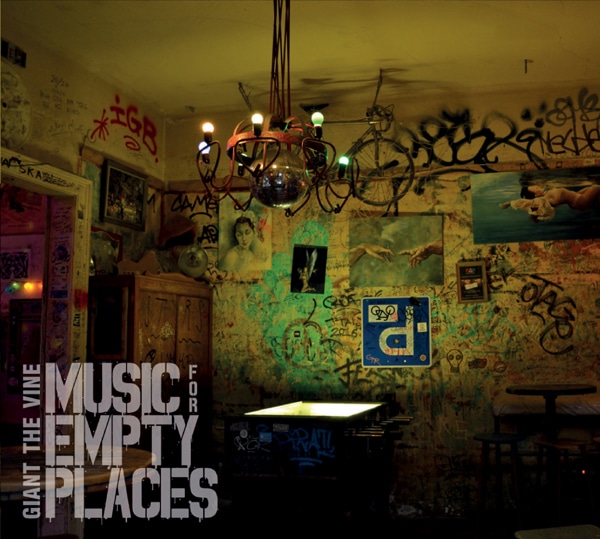A metà strada tra il progressive rock dei primi anni 70 e l’alternative di fine millennio prende forma “Music for Empty Places”, album d’esordio dei liguri GIANT THE VINE.
La band nasce intorno al 2014, passa attraverso i consueti cambi di formazione necessari per individuare le affinità, e per costruire l’intesa che consente di affrontare i tempi dispari, gli arpeggi e le sospensioni di mellotron e piano, ma anche riff potenti e assoli vibranti.
Non a caso, tra le influenze del gruppo troviamo gli Yes, i Genesis e i King Crimson insieme a Mogwai, Secret Machines, Riverside e Porcupine Tree.
Otto brani strumentali confezionati con cura artigianale, con protagonisti due chitarristi (Fabio Vrenna e Fulvio Solari) ed un batterista (Daniele Riotti) ai quali si sono aggiunti il torinese Marco Fabricci al basso e due tastieristi/pianisti (Chico Schoen e Ilaria Vrenna), tra tese progressioni elettriche e momenti estaticamente malinconici.
Le note di copertina descrivono i temi del disco che ruotano attorno all’assenza.
Non solo l’assenza di testi, con cui dare voce alle idee che i Giant the Vine vogliono trasmettere, in Music for Empty Places si parla dell’assenza dei genitori, che Fabio Vrenna ha perduto nel giro di pochi mesi durante le registrazioni del disco (Past is Over), dell’assenza delle persone smarrite (Lost People), e dell’assenza, più in generale, di qualcuno che è appena andato via lasciando le luci accese.
Sorprende, infine, un ringraziamento a Mark Hollis diventato postumo quando il cd era in stampa.
Moderno progressive rock (con reminiscenze seventies) per uno spleen cinematico di rapente bellezza !!!
Between the progressive rock of the early 70s and the alternative rock of the end of the millennium, “Music for Empty Places”, the debut album of the Ligurian band GIANT THE VINE, takes shape.
The band was born around 2014, and goes through the usual changes of line-up necessary to identify affinities and build a personal sound with odd times, guitars arpeggios and suspensions of mellotron and piano, but also powerful riffs and emotional solos.
Not surprisingly, among the influences of the group we find Yes, Genesis and King Crimson together with Mogwai, Secret Machines, Riverside and Porcupine Tree.
Eight carefully crafted instrumental tracks, featuring two guitarists (Fabio Vrenna and Fulvio Solari) and a drummer (Daniele Riotti) who were joined by Marco Fabricci on bass and two keyboardists / pianists (Chico Schoen and Ilaria Vrenna), between tense electric progressions and ecstatic melancholy moments.
The main theme of the album is the absence.
Not only the absence of texts, with which to give voice to the ideas that Giant the Vine want to convey, in “Music for Empty Places” we talk about the absence of parents, which Fabio Vrenna lost within a few months during the recordings of the album (Past is Over), the absence of lost people (Lost People), and the absence, more generally, of someone who has just left leaving the lights on.
The band was born around 2014, and goes through the usual changes of line-up necessary to identify affinities and build a personal sound with odd times, guitars arpeggios and suspensions of mellotron and piano, but also powerful riffs and emotional solos.
Not surprisingly, among the influences of the group we find Yes, Genesis and King Crimson together with Mogwai, Secret Machines, Riverside and Porcupine Tree.
Eight carefully crafted instrumental tracks, featuring two guitarists (Fabio Vrenna and Fulvio Solari) and a drummer (Daniele Riotti) who were joined by Marco Fabricci on bass and two keyboardists / pianists (Chico Schoen and Ilaria Vrenna), between tense electric progressions and ecstatic melancholy moments.
The main theme of the album is the absence.
Not only the absence of texts, with which to give voice to the ideas that Giant the Vine want to convey, in “Music for Empty Places” we talk about the absence of parents, which Fabio Vrenna lost within a few months during the recordings of the album (Past is Over), the absence of lost people (Lost People), and the absence, more generally, of someone who has just left leaving the lights on.
Finally, a special thanks to Mark Hollis who became posthumous when the CD was in print.
Modern progressive rock (with seventies reminiscences) for a cinematic spleen of touching beauty !!!




